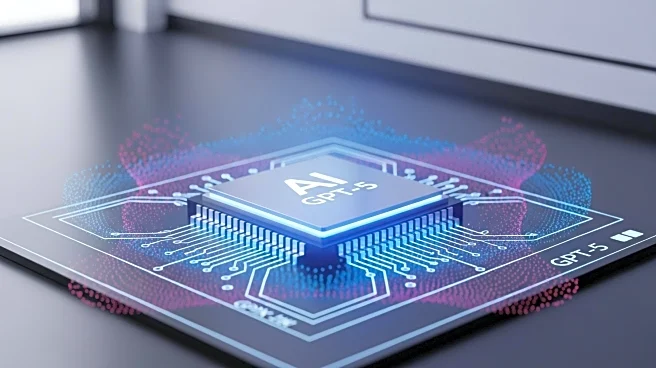What is the story about?
What's Happening?
OpenAI has released a new benchmark, GDPval, to test how its AI models perform compared to human professionals across a wide range of industries and jobs. The test aims to understand how close OpenAI's systems are to outperforming humans at economically valuable work. OpenAI's GPT-5 model and Anthropic's Claude Opus 4.1 are approaching the quality of work produced by industry experts. The benchmark covers nine industries contributing to America's GDP, testing AI performance in 44 occupations. The results show that GPT-5-high was ranked as better than or on par with industry experts 40.6% of the time, while Claude Opus 4.1 scored 49%.
Why It's Important?
The progress of AI models like GPT-5 in performing tasks traditionally done by humans has significant implications for various industries. As AI models become more capable, they can assist professionals in offloading routine tasks, allowing them to focus on higher-value activities. This could lead to increased efficiency and productivity across sectors such as healthcare, finance, and manufacturing. However, it also raises concerns about job displacement and the need for workforce adaptation. Companies and policymakers must consider strategies for integrating AI into the workforce while addressing potential socioeconomic impacts.
What's Next?
OpenAI plans to develop more robust tests to account for a broader range of industries and interactive workflows. As AI models continue to improve, they may become integral tools for professionals, enhancing their capabilities and productivity. The ongoing development of benchmarks like GDPval will be crucial in assessing AI's proficiency in real-world tasks and guiding its integration into various sectors. Stakeholders must monitor these advancements and prepare for the potential shifts in job roles and industry dynamics.
Beyond the Headlines
The advancement of AI models like GPT-5 raises ethical considerations regarding the balance between technological progress and human employment. As AI systems become more proficient, there is a need for discussions on the ethical use of AI in the workplace and the development of policies to ensure fair and equitable transitions for affected workers. The long-term impact of AI on job markets and societal structures will require careful planning and collaboration among industry leaders, policymakers, and civil society.















